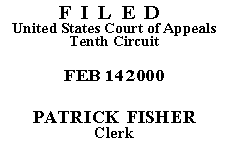

| THOMAS CAMPBELL HEADLEY,
Petitioner-Appellant, v. HANK GALETKA, Warden; STATE OF UTAH, Respondents-Appellees. |
|
Petitioner Thomas C. Headley, a prisoner of the State of Utah appearing pro se, appeals from the dismissal of his petition for habeas relief filed under 28 U.S.C. § 2254. He has filed a motion for a certificate of appealability, which we construe as a motion for a certificate of probable cause,(1)
and a motion for leave to proceed in forma pauperis on appeal.(2) We have jurisdiction under 28 U.S.C. § 1291.
Petitioner was charged in 1991 with several sex offenses against children. He pled guilty to one count of sexual abuse of a child, a second degree felony, in exchange for the State's agreement to drop other, more serious, charged offenses and not bring any further charges. After petitioner completed a ninety-day diagnostic evaluation, the trial court sentenced him to one to fifteen years' imprisonment and ordered him to pay the costs of extradition and the victim's therapy.
After petitioner's sentencing in 1992, petitioner's appointed counsel sought and obtained permission to withdraw from representation on the basis that petitioner wished to assert a claim of ineffective assistance of counsel on appeal. Another attorney was appointed to represent petitioner, who perfected petitioner's direct appeal. Counsel identified two issues in the amended docketing statement for petitioner's direct appeal: (1) ineffective assistance of trial counsel; and (2) under Anders v. California, 386 U.S. 738 (1967), no other meritorious issues could successfully be raised. See R. Doc. 9, Ex. 12, at 1 ¶ 5. On September 30, 1992, petitioner, through counsel, filed a motion to dismiss his appeal so that he could file a motion in the trial court to withdraw his guilty plea. See id. Doc. 9, Ex. 13. Counsel also filed petitioner's affidavit declaring his desire that his appeal be dismissed. See id. Doc. 9, Ex. 14. Petitioner's motion to withdraw his guilty plea was denied. Petitioner, at this point representing himself, proceeded to pursue state collateral relief, which was denied on the ground of procedural bar.
In this § 2254 petition, petitioner asserts twenty-two claims. The district court referred the case to a magistrate judge, who summarized and addressed petitioner's claims. See id. Doc. 35. The magistrate judge recommended that most of petitioner's claims be dismissed based on the state court's procedural bar determination. See id. at 6-8. The magistrate judge found that petitioner failed to show either cause or prejudice to excuse the default, or that a miscarriage of justice would result from the failure of the federal court to review his petition. See id. The magistrate judge recommended that the rest of petitioner's claims be dismissed because they challenged the conditions of his confinement and therefore should have been brought under 42 U.S.C. § 1983 instead of 28 U.S.C. § 2254. See id. at 8-9. After considering petitioner's objections, but without holding a hearing, the district court adopted the magistrate judge's recommendation, and dismissed the petition. See id. Doc. 37.
We review the district court's denial of habeas relief de novo. See Sinclair v. Henman, 986 F.2d 407, 408 (10th Cir. 1993). We also review the denial of a hearing de novo. See Medina v. Barnes, 71 F.3d 363, 370 (10th Cir. 1995). We construe petitioner's pro se pleadings liberally. See Haines v. Kerner, 404 U.S. 519, 520-21 (1972) (per curiam). In order to obtain a certificate of probable cause for appeal, petitioner must make a "substantial showing of the denial of [a] federal right." Barefoot v. Estelle, 463 U.S. 880, 893 (1983) (quotation omitted).
On appeal, petitioner asserts in a conclusory fashion that the district court ignored his arguments showing cause for his procedural default, and that he is actually innocent of the crime to which he pled guilty. We have carefully reviewed the parties' materials, the magistrate judge's recommendation, and the district court's order. We conclude that petitioner has failed to make a substantial showing of the denial of a federal right for substantially the same reasons as those set forth in the magistrate judge's recommendation, adopted by the district court in its March 19, 1999 order.
Accordingly, petitioner's motion for leave to proceed in forma pauperis on appeal is granted, his application for a certificate of probable cause is denied, and the appeal is DISMISSED. The mandate shall issue forthwith.
Entered for the Court
Circuit Judge
*. This order and judgment is not binding precedent, except under the doctrines of law of the case, res judicata, and collateral estoppel. The court generally disfavors the citation of orders and judgments; nevertheless, an order and judgment may be cited under the terms and conditions of 10th Cir. R. 36.3.
1. Because petitioner filed his habeas petition on April 15, 1996, before the April 24, 1996 enactment of the Antiterrorism and Effective Death Penalty Act of 1996, the certificate of appealability provisions of that act do not apply. See Lindh v. Murphy, 521 U.S. 320, 336 (1997). Instead, we construe petitioner's motion as an application for a certificate of probable cause. Cf. United States v. Kunzman, 125 F.3d 1363, 1364 n.2 (10th Cir. 1997).
2. A habeas corpus action under § 2254 is not a civil action as contemplated by the Prison Litigation Reform Act, and petitioner is not required to submit a certified statement of his trust account. See United States v. Simmonds, 111 F.3d 737, 741, 744 (10th Cir. 1997).